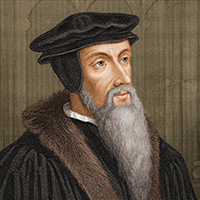 John Calvin: “The Knowledge of God and the Knowledge of Man”
John Calvin: “The Knowledge of God and the Knowledge of Man”
Our wisdom, in so far as it ought to be deemed true and solid Wisdom, consists almost entirely of two parts: the knowledge of God and of ourselves. But as these are connected together by many ties, it is not easy to determine which of the two precedes and gives birth to the other. For, in the first place, no man can survey himself without forthwith turning his thoughts towards the God in whom he lives and moves; because it is perfectly obvious that the endowments which we possess cannot possibly be from ourselves; nay, that our very being is nothing else than subsistence in God alone.
In the second place, those blessings which unceasingly distil to us from heaven are like streams conducting us to the fountain. Here, again, the infinitude of good which resides in God becomes more apparent from our poverty. In particular, the miserable ruin into which the revolt of the first man has plunged us compels us to turn our eyes upwards. We are accordingly urged by our own evil things to consider the good things of God; and, indeed, we cannot aspire to Him in earnest until we have begun to be displeased with ourselves. Every person, therefore, on coming to the knowledge of himself, is not only urged to seek God, but is also led as by the hand to find him.
On the other hand, it is evident that man never attains to a true self-knowledge until he has previously contemplated the face of God, and come down after such contemplation to look into himself. For (such is our innate pride) we always seem to ourselves just, and upright, and wise, and holy, until we are convinced by clear evidence of our injustice, vileness, folly, and impurity. Convinced, however, we are not, if we look to ourselves only, and not to the Lord also—He being the only standard by the application of which this conviction can be produced. For since we are all naturally prone to hypocrisy, any empty semblance of righteousness is quite enough to satisfy us instead of righteousness itself.
But should we once begin to raise our thoughts to God, and reflect what kind of Being he is, and how absolute the perfection of that righteousness, and wisdom, and virtue, to which as a standard we are bound to be conformed, what formerly delighted us by its false show of righteousness will become polluted with the greatest iniquity; what strangely imposed upon us under the name of wisdom will disgust by its extreme folly; and what presented the appearance of virtuous energy will be condemned as the most miserable impotence. So far are those qualities in us, which seem most perfect, from corresponding to the divine purity.
Hence that dread and amazement with which, as Scripture uniformly relates, holy men were struck and overwhelmed whenever they beheld the presence of God. When we see those who previously stood firm and secure so quaking with terror that the fear of death takes hold of them—nay, they are, in a manner, swallowed up and annihilated—the inference to be drawn is that men are never duly touched and impressed with a conviction of their insignificance until they have contrasted themselves with the majesty of God.
But though the knowledge of God and the knowledge of ourselves are bound together by a mutual tie, due arrangement requires that we treat of the former in the first place, and then descend to the latter.
~ From The Institutes of Christian Religion


